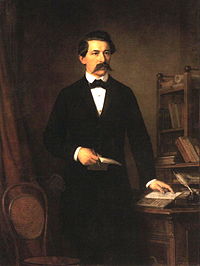A Welsh and Hungarian connection with the The Bards of Wales - A Walesi Bárdok by János Arany

In Hungary, there is a famous ballad from the poem called "A Walesi Bárdok" - the Bards of Wales – written by János Arany in 1857. It tells of how in 1277 King Edward I of England attended a banquet in Montgomery Castle. It was held to celebrate his victories over the Welsh and he called for a Welsh bard to sing his praises. Bards were highly regarded in Welsh society at that time, and were thought to be descendants of the Celtic druids.
The praise of the foreign invading English King was something that the bards refused to do. They denounced him as a butcher with the blood of an entire nation on his hands. So, one by one, the King sends them to be burnt at the stake. Still not one of the proud Welsh Bards can be found to flatter him as their conqueror and he ends up murdering 500 in total. The English King returns to London after ravaging the Welsh countryside in a terrible act of revenge. It is said that the evil King is forever haunted by the shades of the dead bards, spending his days in terror of their torment.

The recounting of the legend of the "Slaughter of the Bards" by János Arany was actually written as an allegory for the treatment of the Hungarian nation by the Austrians following the failed bid for Hungarian independence from Austria in 1848-49. So this story of Welsh defiance to English rule, is used as a defining work for Hungary's cultural identity. Janos Arany wrote the verses after refusing to write a poem celebrating the Emperor of Austria Franz Joseph following the unsuccessful revolution in 1848 against the empire. His 19th Century ballad is still taught in Hungarian schools.
Hungarian journalist, writer, poet, and translator János Arany (2 March 1817—22 October 1882), wrote more than 40 ballads, which have been translated into over 50 languages. Among his other works he is famous for writing The Toldi trilogy. This epic poem takes its inspiration from the legendary Miklós Toldi, who served in the 14th century army of Hungarian King Louis and was the King's champion. János Arany died in Budapest on 22 October 1882.
- Welsh
- English





